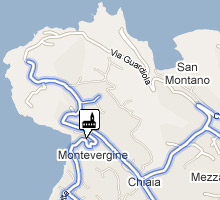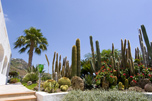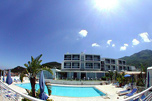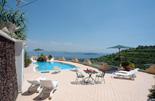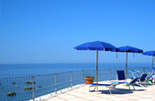Description
Along the narrow road that leads to the beaches of Chiaia and Sciavica (now the San Francesco beach), among the lava rocks of the hill of Zaro, stands the church of S. Francesco of Paola, also known as St. Maria Montevergine. The pink facade is flanked on the right side by the bell tower while on the left side is the former hermitage, now a private villa, characterized by a series of beautiful arches on both floors. All walls are in stone and lava rock. The facade is decorated with a round in majolica tiles inside the tympanum, which rests on a cornice. Four smooth pilasters mark off three sections: in the central main entrance stands the gray stone molding with semicircular, the lateral ones more modest house two doors. The interior has a basilica plan, is divided into three naves, the middle, covered by a barrel vault, narrowing a space with vault and leads to the sanctuary where is the dome supported by a high tambour. On the left wall of the nave there are two cherubs in marble surmounted by a dove of cloud, carried out by an unknown sculptor in Campania in 1789, is a fragment of a marble cona, originally located on the back wall of the chancel. It also found: the figure of Our Lady of the Assumption in bas-relief, a small crucifix of '700, a bust of St. Francesco of Paola, a wooden statue of St. Anne dating from the eighteenth century, the pipe organ built in 1781 by Domenico Antonio Rossi.Historical Info
The origins of the church are linked to those of the Hermitage of St. Montevergine Mary, founded at the foot of the hill of Zaro in the second half of the eighteenth century next to a small very old church, by the will of an old hermit, Fat. Michele Alemanno. He, after spending thirty years in the hermitage of S. Nicola on Epomeo, now elderly, was induced by harsh weather conditions of the mountain to look for a new solitary place. The University of Forio granted him land in front of the existing church, dating back at least to the seventeenth century. As evidenced by a blade of 1636 located in the apse. The University contributed, together with the faithful, the construction of the new building. This allowed the city to preserve the right of patronage on the complex. The act of decurial May 31, 1840, preserved in the town, documenting the concern by the municipality for the state of abandonment, even spiritual, they were in the chapel and the church, no chaplain, and managed to period of three hermits from questionable conduct. The discussion was long, contrasting proposals: one expected to entrust the administration of the Reformed Church to the Franciscan friars who already managed in an exemplary manner the monastery of the town whilst meeting the spiritual needs of the faithful, another proposal consisted of entrusting the church to a chaplain. It was precisely this solution to prevail in 1863, when the city gave away the hermits and the church a chaplain in the renewed and expanded, building a garden, a cistern, galleries, dormitories and other rooms. In 1924 the town gave in perpetual lease adjoining the convent at the Stead family, which attributed to the Church a new building. In 1948 the building was expanded again, the three aisles were built, the façade was renovated and enhanced with a massive bell.Info
Address: Via Tommaso Cigliano
City Hall: 80075 - Forio
Foundation Age: XVII cent.
Date: 1600-1650
web: www.sanfrancescodipaola.org
Orario Sante Messe: dom 10:15, 18:00/19:00
Parroco: Fat. Francesco Piro
Bus lines: 1 - 14 - 2 - CD - CS
Objets d'art
Canvas
- Madonna con Bambino e i SS. Caterina d'Alessandria e Francesco di Paola by Di Spigna Alfonso e Calise Cesare
Near to
Villa Candida
App. S. Francesco
Mezzatorre Resort SPA
Hotel Cesotta
Hotel Tritone Terme
Hotel Terme La Bagattella
Porto di Forio
Mezzatorre
Giardini La Mortella
La Mortella
La Colombaia
Belv. Giardino Esotico
Bosco di Zaro
Stab. da Nicola
Punta Caruso
Baia di San Francesco
Mezzatorre Resort SPA
Tritone Terme Beauty
Terme La Bagattella
Rist. da Nicola
Rist. La Rondinella
Rist. La Sciavica
Teatro Greco Recital Hall
Farm. Dr. Migliaccio









